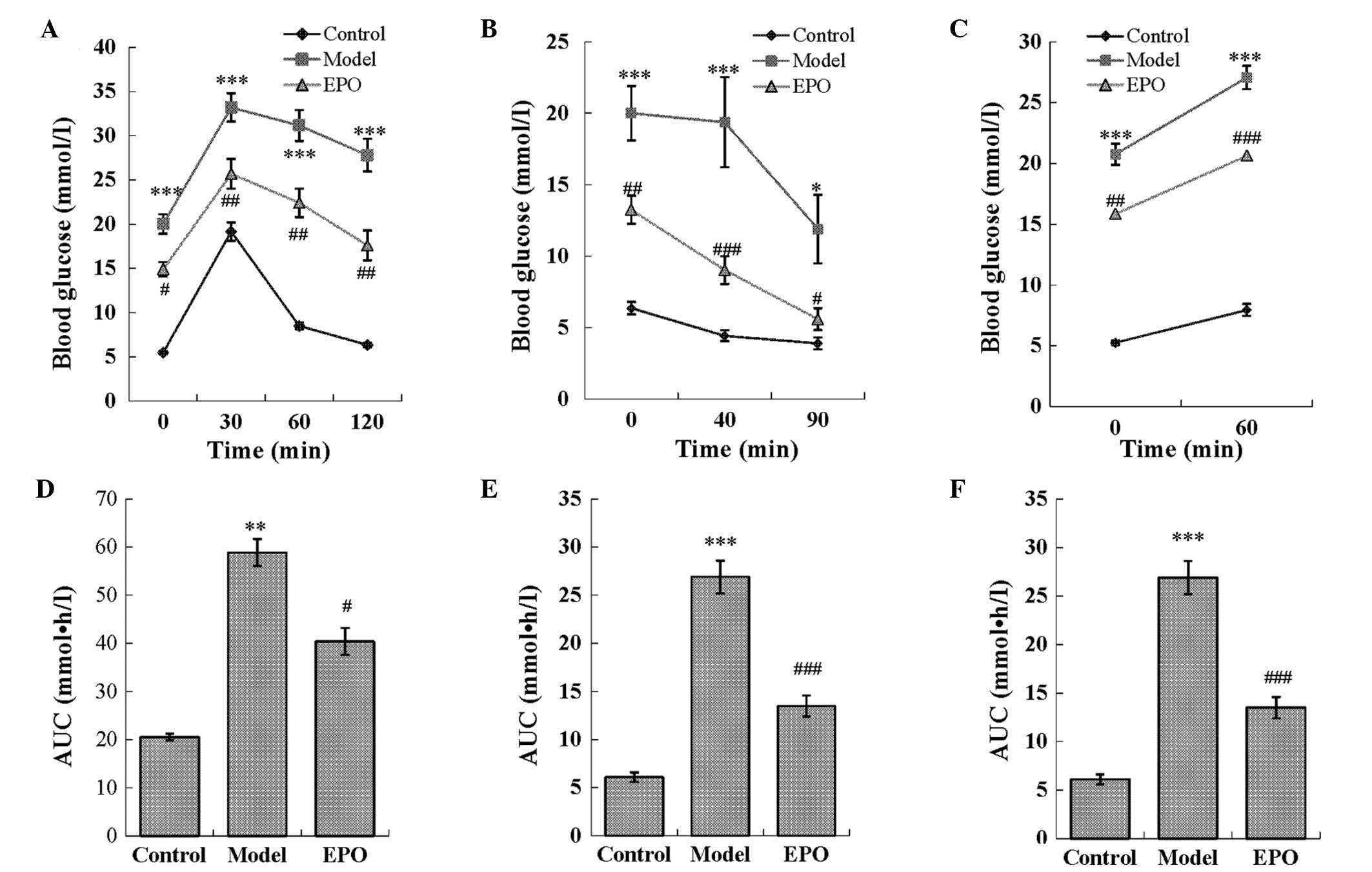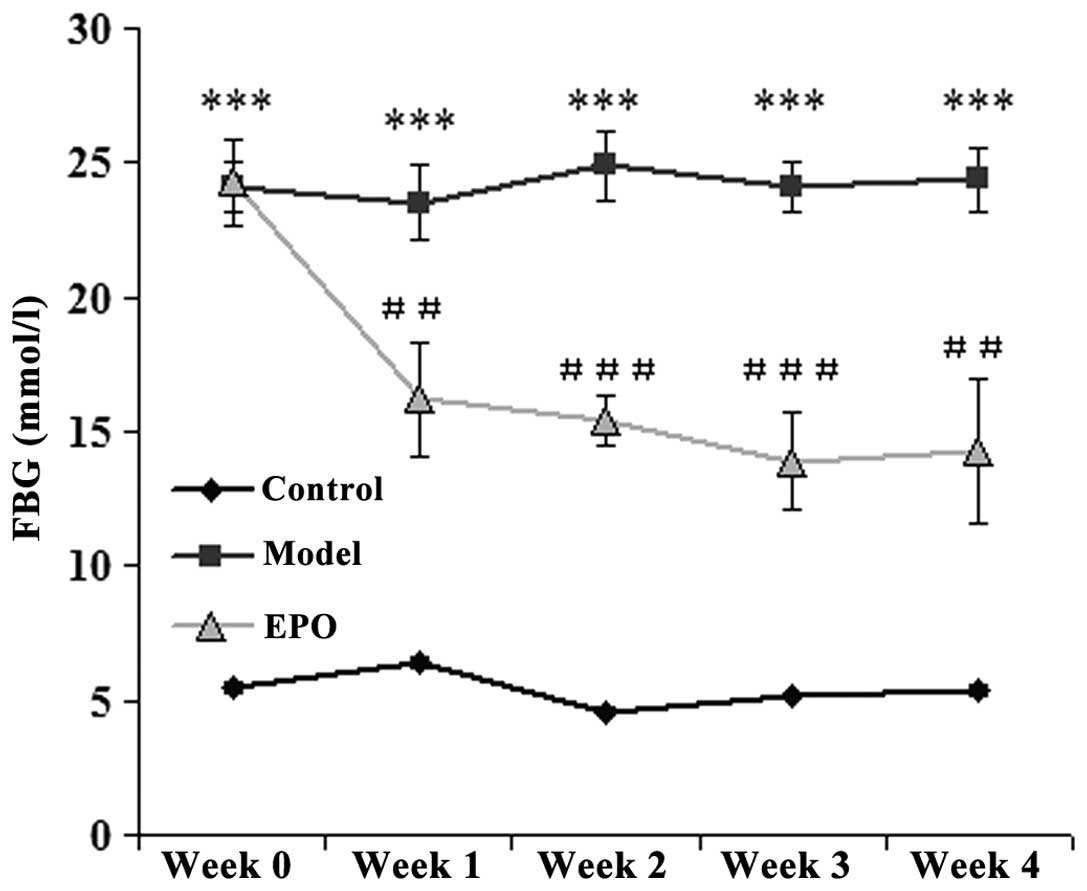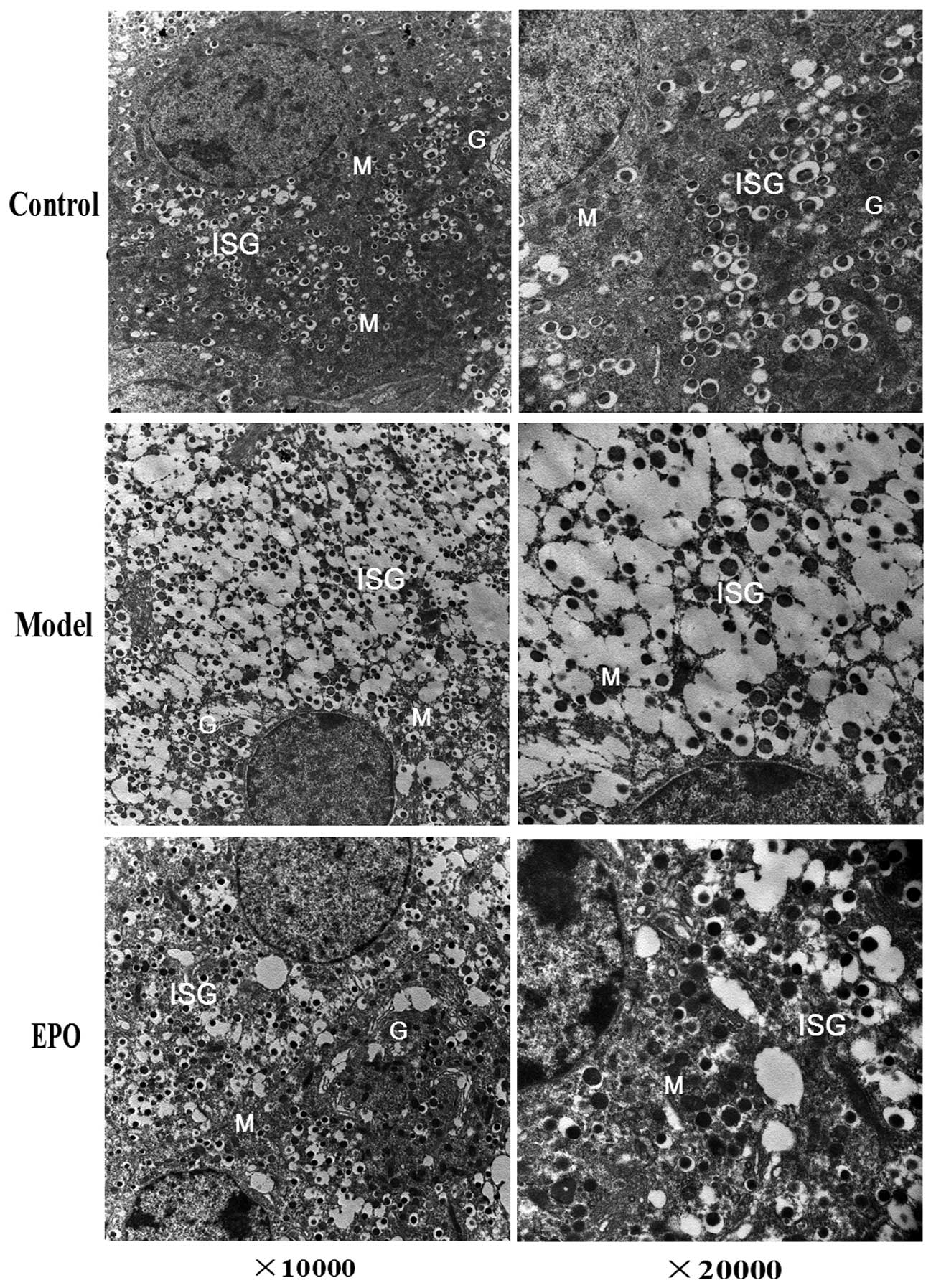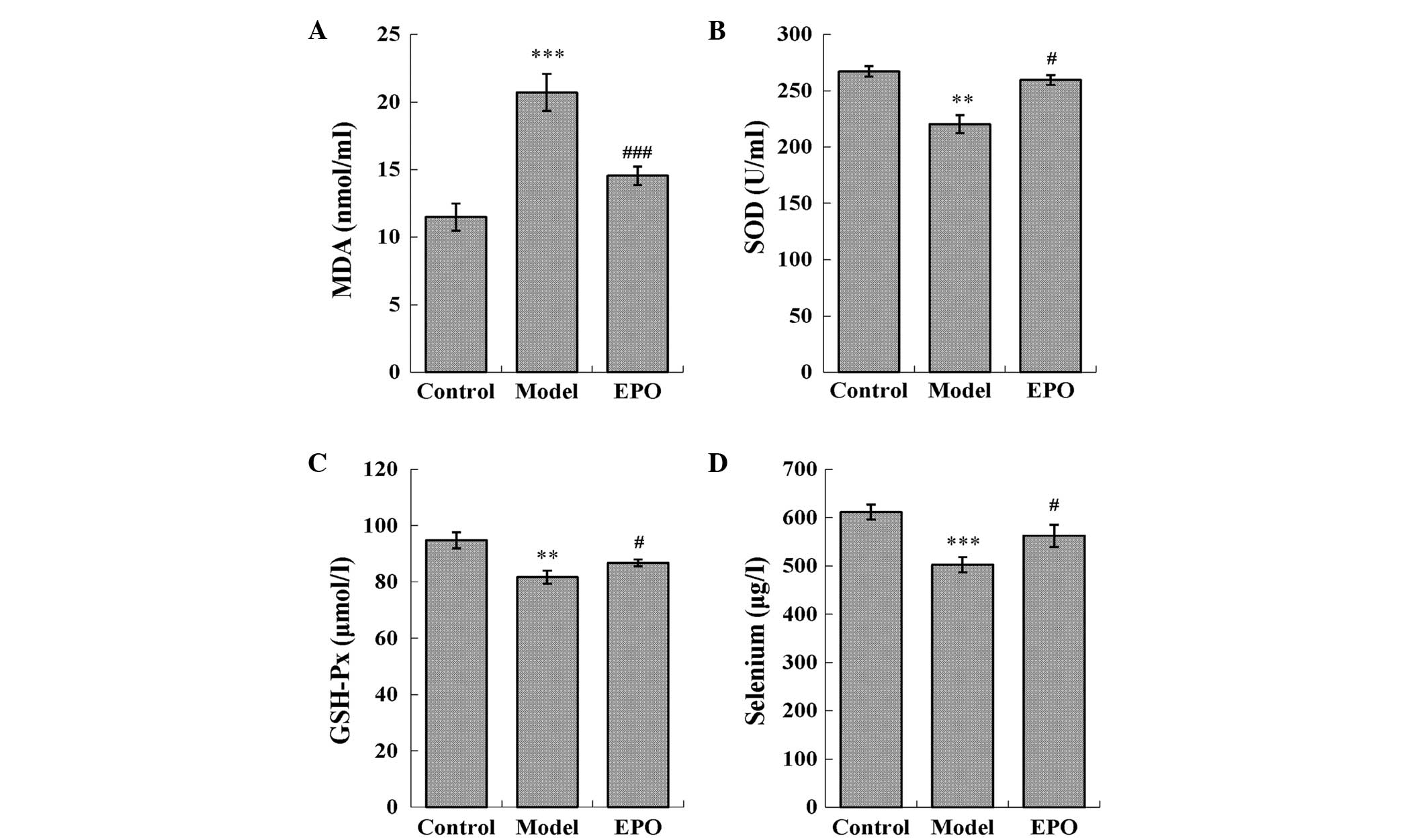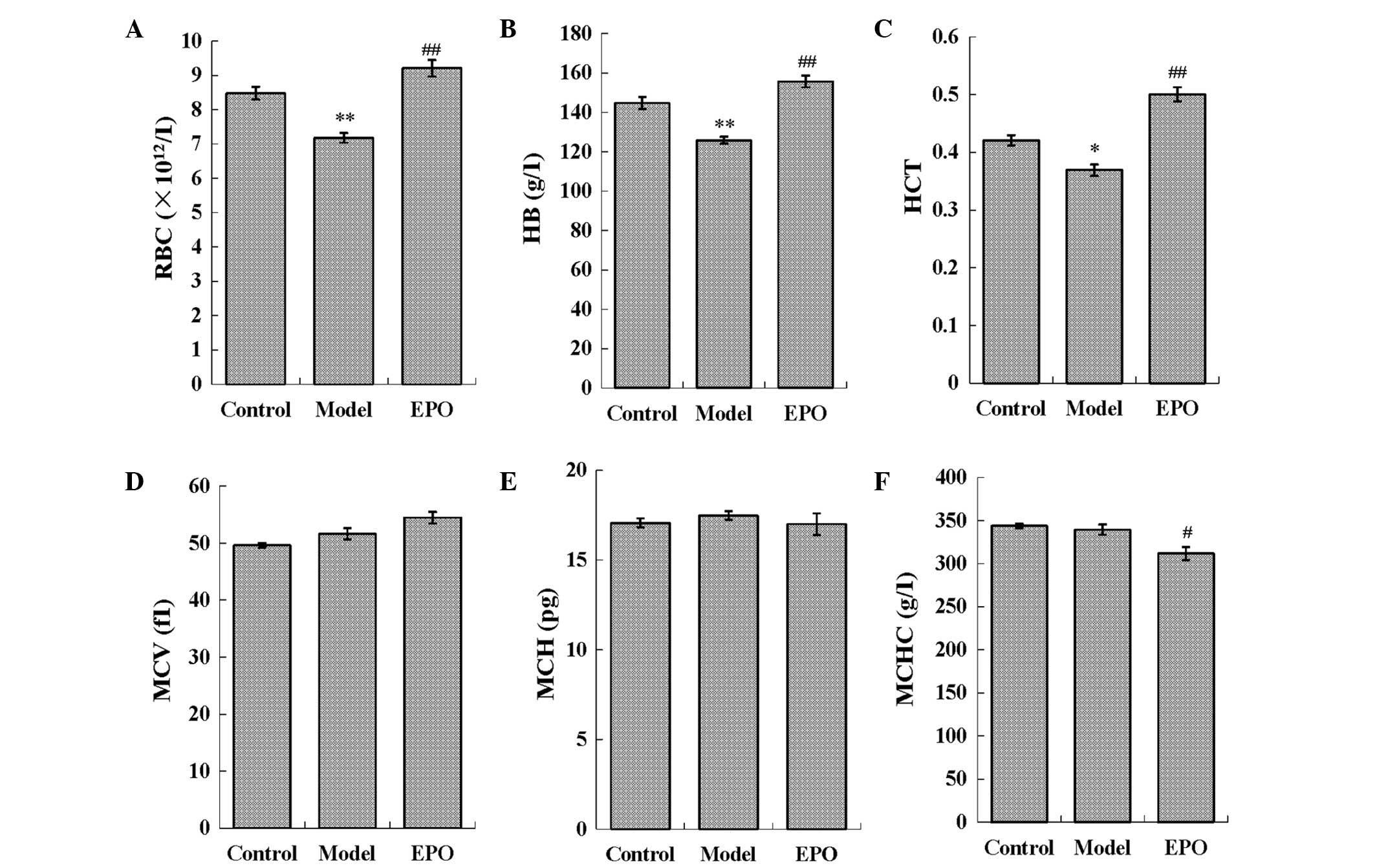|
1
|
Chateauvieux S, Grigorakaki C, Morceau F,
Dicato M and Diederich M: Erythropoietin, erythropoiesis and
beyond. Biochem Pharmacol. 82:1291–1303. 2011. View Article : Google Scholar : PubMed/NCBI
|
|
2
|
Zhang Y, Wang L, Dey S, Alnaeeli M, Suresh
S, Rogers H, Teng R and Noguchi CT: Erythropoietin action in stress
response, tissue maintenance and metabolism. Int J Mol Sci.
15:10296–10333. 2014. View Article : Google Scholar : PubMed/NCBI
Choi D, Retnakaran R and Woo M: The
extra-hematopoietic role of erythropoietin in diabetes mellitus.
Curr Diabetes Rev. 7:284–290. 2011. View Article : Google Scholar : PubMed/NCBI
|
|
3
|
Choi D, Retnakaran R and Woo M: The
extra-hematopoietic role of erythropoietin in diabetes mellitus.
Curr Diabetes Rev. 7:284–290. 2011. View Article : Google Scholar : PubMed/NCBI
|
|
4
|
Chikuma M, Masuda S, Kobayashi T, Nagao M
and Sasaki R: Tissue-specific regulation of erythropoietin
production in the murine kidney, brain, and uterus. Am J Physiol
Endocrinol Metab. 279:E1242–E1248. 2000.PubMed/NCBI
|
|
5
|
Lamon S, Zacharewicz E, Stephens AN and
Russell AP: EPO-receptor is present in mouse C2C12 and human
primary skeletal muscle cells but EPO does not influence
myogenesis. Physiol Rep. 2:e002562014. View
Article : Google Scholar : PubMed/NCBI
|
|
6
|
Dimitrijevic ZM, Cvetkovic TP, Djordjevic
VM, Pavlovic DD, Stefanovic NZ, Stojanovic IR, Paunovic GJ and
Velickovic-Radovanovic RM: How the duration period of
erythropoietin treatment influences the oxidative status of
hemodialysis patients. Int J Med Sci. 9:808–815. 2012. View Article : Google Scholar : PubMed/NCBI
|
|
7
|
Nairz M, Sonnweber T, Schroll A, Theurl I
and Weiss G: The pleiotropic effects of erythropoietin in infection
and inflammation. Microbes Infect. 14:238–246. 2012. View Article : Google Scholar :
|
|
8
|
Chen S, Li J, Peng H, Zhou J and Fang H:
Administration of erythropoietin exerts protective effects against
glucocorticoid-induced osteonecrosis of the femoral head in rats.
Int J Mol Med. 33:840–848. 2014.PubMed/NCBI
|
|
9
|
Stoyanoff TR, Todaro JS, Aguirre MV,
Zimmermann MC and Brandan NC: Amelioration of
lipopolysaccharide-induced acute kidney injury by erythropoietin:
Involvement of mitochondria-regulated apoptosis. Toxicology.
318:13–21. 2014. View Article : Google Scholar : PubMed/NCBI
|
|
10
|
Yang W, Lu J, Weng J, Jia W, Ji L, Xiao J,
Shan Z, Liu J, Tian H, Ji Q, et al China National Diabetes and
Metabolic Disorders Study Group: Prevalence of diabetes among men
and women in China. N Engl J Med. 362:1090–1101. 2010. View Article : Google Scholar : PubMed/NCBI
|
|
11
|
Janghorbani M and Amini M: Incidence of
metabolic syndrome and its risk factors among type 2 diabetes
clinic attenders in Isfahan, Iran. Endokrynol Pol. 63:372–380.
2012.PubMed/NCBI
|
|
12
|
Ohshima K, Mogi M, Jing F, Iwanami J,
Tsukuda K, Min LJ, Ogimoto A, Dahlöf B, Steckelings UM, Unger T, et
al: Direct angiotensin II type 2 receptor stimulation ameliorates
insulin resistance in type 2 diabetes mice with PPARγ activation.
PLoS One. 7:e483872012. View Article : Google Scholar
|
|
13
|
Fenjves ES, Ochoa MS, Cabrera O, Mendez
AJ, Kenyon NS, Inverardi L and Ricordi C: Human, nonhuman primate,
and rat pancreatic islets express erythropoietin receptors.
Transplantation. 75:1356–1360. 2003. View Article : Google Scholar : PubMed/NCBI
|
|
14
|
Kwon MS, Kim MH, Kim SH, Park KD, Yoo SH,
Oh IU, Pak S and Seo YJ: Erythropoietin exerts cell protective
effect by activating PI3K/Akt and MAPK pathways in C6 Cells. Neurol
Res. 36:215–223. 2014. View Article : Google Scholar : PubMed/NCBI
|
|
15
|
Fenjves ES, Ochoa MS, Gay-Rabinstein C,
Molano RD, Pileggi A, Mendez AJ, Inverardi L and Ricordi C:
Adenoviral gene transfer of erythropoietin confers cytoprotection
to isolated pancreatic islets. Transplantation. 77:13–18. 2004.
View Article : Google Scholar : PubMed/NCBI
|
|
16
|
Wietecha-Posłuszny R, Lech T and
Kościelniak P: Application of three spectrometric methods to total
selenium determination in postmortem material in a case of acute
selenium compound poisoning. J Forensic Sci. 56:518–521. 2011.
View Article : Google Scholar
|
|
17
|
Wang Q, Pfister F, Dorn-Beineke A, vom
Hagen F, Lin J, Feng Y and Hammes HP: Low-dose erythropoietin
inhibits oxidative stress and early vascular changes in the
experimental diabetic retina. Diabetologia. 53:1227–1238. 2010.
View Article : Google Scholar : PubMed/NCBI
|
|
18
|
Benstoem C, Goetzenich A, Kraemer S,
Borosch S, Manzanares W, Hardy G and Stoppe C: Selenium and its
supplementation in cardiovascular disease-what do we know?
Nutrients. 7:3094–3118. 2015. View Article : Google Scholar : PubMed/NCBI
|
|
19
|
Christensen B, Nellemann B, Larsen MS,
Thams L, Sieljacks P, Vestergaard PF, Bibby BM, Vissing K,
Stødkilde-Jørgensen H, Pedersen SB, et al: Whole body metabolic
effects of prolonged endurance training in combination with
erythropoietin treatment in humans: A randomized placebo controlled
trial. Am J Physiol Endocrinol Metab. 305:E879–E889. 2013.
View Article : Google Scholar : PubMed/NCBI
|
|
20
|
Kristensen PL, Høi-Hansen T, Olsen NV,
Pedersen-Bjergaard U and Thorsteinsson B: Erythropoietin during
hypoglycaemia in type 1 diabetes: Relation to basal
renin-angiotensin system activity and cognitive function. Diabetes
Res Clin Pract. 85:75–84. 2009. View Article : Google Scholar : PubMed/NCBI
|
|
21
|
Wang L, Teng R, Di L, Rogers H, Wu H, Kopp
JB and Noguchi CT: PPARα and Sirt1 mediate erythropoietin action in
increasing metabolic activity and browning of white adipocytes to
protect against obesity and metabolic disorders. Diabetes.
62:4122–4131. 2013. View Article : Google Scholar : PubMed/NCBI
|
|
22
|
Pan Y, Shu JL, Gu HF, Zhou DC, Liu XL,
Qiao QY, Fu SK, Gao FH and Jin HM: Erythropoietin improves insulin
resistance via the regulation of its receptor-mediated signaling
pathways in 3T3L1 adipocytes. Mol Cell Endocrinol. 367:116–123.
2013. View Article : Google Scholar : PubMed/NCBI
|
|
23
|
Drüeke TB, Locatelli F, Clyne N, Eckardt
KU, Macdougall IC, Tsakiris D, Burger HU and Scherhag A; CREATE
Investigators: Normalization of hemoglobin level in patients with
chronic kidney disease and anemia. N Engl J Med. 355:2071–2084.
2006. View Article : Google Scholar : PubMed/NCBI
|
|
24
|
Rosengren AH, Braun M, Mahdi T, Andersson
SA, Travers ME, Shigeto M, Zhang E, Almgren P, Ladenvall C,
Axelsson AS, et al: Reduced insulin exocytosis in human pancreatic
β-cells with gene variants linked to type 2 diabetes. Diabetes.
61:1726–1733. 2012. View Article : Google Scholar : PubMed/NCBI
|
|
25
|
Tersey SA, Nishiki Y, Templin AT, Cabrera
SM, Stull ND, Colvin SC, Evans-Molina C, Rickus JL, Maier B and
Mirmira RG: Islet β-cell endoplasmic reticulum stress precedes the
onset of 1 diabetes in the nonobese diabetic mouse model. Diabetes.
61:818–827. 2012. View Article : Google Scholar : PubMed/NCBI
|
|
26
|
He H, Wu T, Xiong J, Chen K and Mo Z:
Effect of erythropoietin on the proliferation and apoptosis of
neonatal porcine islet cells. Zhong Nan Da Xue Xue Bao Yi Xue Ban.
35:1115–1122. 2010.PubMed/NCBI
|
|
27
|
Shuai H, Zhang J, Zhang J, Xie J, Zhang M,
Yu Y and Zhang L: Erythropoietin protects pancreatic β-cell line
NIT-1 cells against cytokine-induced apoptosis via
phosphatidylinositol 3-kinase/Akt signaling. Endocr Res. 36:25–34.
2011. View Article : Google Scholar
|
|
28
|
Yan LJ: Pathogenesis of chronic
hyperglycemia: From reductive stress to oxidative stress. J
Diabetes Res. 2014:1379192014. View Article : Google Scholar : PubMed/NCBI
|
|
29
|
Yu T, Li L, Bi Y, Liu Z, Liu H and Li Z:
Erythropoietin attenuates oxidative stress and apoptosis in Schwann
cells isolated from streptozotocin-induced diabetic rats. J Pharm
Pharmacol. 66:1150–1160. 2014.PubMed/NCBI
|
|
30
|
Luo YH, Li ZD, Liu LX and Dong GH:
Pretreatment with erythropoietin reduces hepatic
ischemia-reperfusion injury. Hepatobiliary Pancreat Dis Int.
8:294–299. 2009.PubMed/NCBI
|
|
31
|
Yang FL, Subeq YM, Chiu YH, Lee R P, Lee
CJ and Hsu BG: Recombinant human erythropoietin reduces
rhabdomyolysis-induced acute renal failure in rats. Injury.
43:367–373. 2012. View Article : Google Scholar : PubMed/NCBI
|
|
32
|
Liu N, Tian J, Wang W, Cheng J, Hu D and
Zhang J: Effect and mechanism of erythropoietin on mesenchymal stem
cell proliferation in vitro under the acute kidney injury
microenvironment. Exp Biol Med (Maywood). 236:1093–1099. 2011.
View Article : Google Scholar
|
|
33
|
Stapleton SR: Selenium: An
insulin-mimetic. Cell Mol Life Sci. 57:1874–1879. 2000. View Article : Google Scholar
|
|
34
|
Rocourt CR and Cheng WH: Selenium
supranutrition: Are the potential benefits of chemoprevention
outweighed by the promotion of diabetes and insulin resistance?
Nutrients. 5:1349–1365. 2013. View Article : Google Scholar : PubMed/NCBI
|
|
35
|
Wang C, Yang S, Zhang N, Mu Y, Ren H, Wang
Y and Li K: Long-term supranutritional supplementation with
selenate decreases hyperglycemia and promotes fatty liver
degeneration by inducing hyperinsulinemia in diabetic db/db mice.
PLoS One. 9:e1013152014. View Article : Google Scholar : PubMed/NCBI
|
|
36
|
Labunskyy VM, Lee BC, Handy DE, Loscalzo
J, Hatfield DL and Gladyshev VN: Both maximal expression of
selenoproteins and selenoprotein deficiency can promote development
of type 2 diabetes-like phenotype in mice. Antioxid Redox Signal.
14:2327–2336. 2011. View Article : Google Scholar : PubMed/NCBI
|
|
37
|
Stranges S, Sieri S, Vinceti M, Grioni S,
Guallar E, Laclaustra M, Muti P, Berrino F and Krogh V: A
prospective study of dietary selenium intake and risk of type 2
diabetes. BMC Public Health. 10:5642010. View Article : Google Scholar : PubMed/NCBI
|
|
38
|
Thomas MC: The high prevalence of anemia
in diabetes is linked to functional erythropoietin deficiency.
Semin Nephrol. 26:275–282. 2006. View Article : Google Scholar : PubMed/NCBI
|
|
39
|
Choi D, Schroer SA, Lu SY, Wang L, Wu X,
Liu Y, Zhang Y, Gaisano H Y, Wagner KU, Wu H, et al: Erythropoietin
protects against diabetes through direct effects on pancreatic beta
cells. J Exp Med. 207:2831–2842. 2010. View Article : Google Scholar : PubMed/NCBI
|
|
40
|
Wang Q, Gorbey S, Pfister F, Höger S,
Dorn-Beineke A, Krügel K, Berrone E, Wu L, Korff T, Lin J, et al:
Long-term treatment with suberythropoietic Epo is vaso- and
neuroprotective in experimental diabetic retinopathy. Cell Physiol
Biochem. 27:769–782. 2011. View Article : Google Scholar : PubMed/NCBI
|















